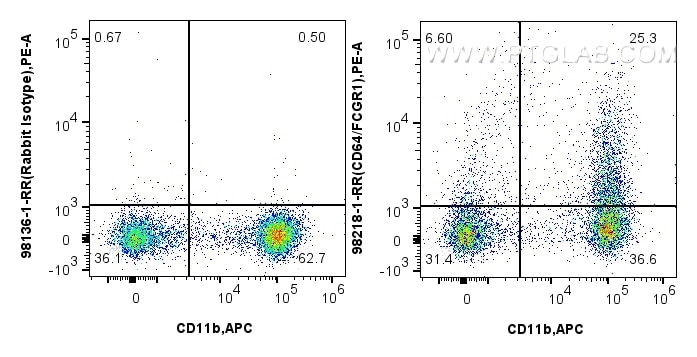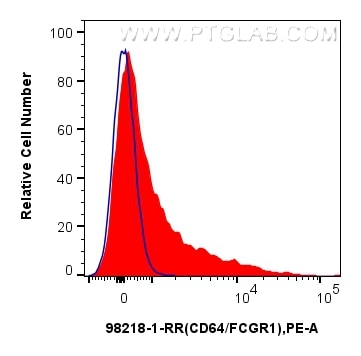Tested Applications
| Positive FC detected in | mouse bone marrow cells |
Recommended dilution
| Application | Dilution |
|---|---|
| Flow Cytometry (FC) | FC : 0.25 ug per 10^6 cells in 100 μl suspension |
| This reagent has been tested for flow cytometric analysis. It is recommended that this reagent should be titrated in each testing system to obtain optimal results. | |
| Sample-dependent, Check data in validation data gallery. | |
Product Information
98218-1-RR targets CD64 in FC applications and shows reactivity with mouse samples.
| Tested Reactivity | mouse |
| Host / Isotype | Rabbit / IgG |
| Class | Recombinant |
| Type | Antibody |
| Immunogen |
Recombinant protein Predict reactive species |
| Full Name | Fc receptor, IgG, high affinity I |
| Calculated Molecular Weight | 45 kDa |
| GenBank Accession Number | NM_010186.5 |
| Gene Symbol | Fcgr1 |
| Gene ID (NCBI) | 14129 |
| Conjugate | Unconjugated |
| Form | Liquid |
| Purification Method | Protein A purfication |
| UNIPROT ID | P26151 |
| Storage Buffer | PBS with 0.09% sodium azide, pH 7.3. |
| Storage Conditions | Store at 2 - 8°C. Stable for one year after shipment. |
Background Information
Fcγ receptor comprise a multigene family of integral membrane glycoproteins that exhibit complex activation or inhibitory effects on cell functions after aggregation by complexed immunoglobulin G (IgG) (PMID: 17005690 ). CD64, also known as FcγRIA, is a high-affinity receptor for the Fc region of IgG. It is expressed by monocytes/macrophages, activated neutrophils, dendritic cells, and early myeloid cells (PMID: 23293080; 19642859; 7680917). CD64 functions in both innate and adaptive immune responses.
Protocols
| Product Specific Protocols | |
|---|---|
| FC protocol for CD64 antibody 98218-1-RR | Download protocol |
| Standard Protocols | |
|---|---|
| Click here to view our Standard Protocols |






